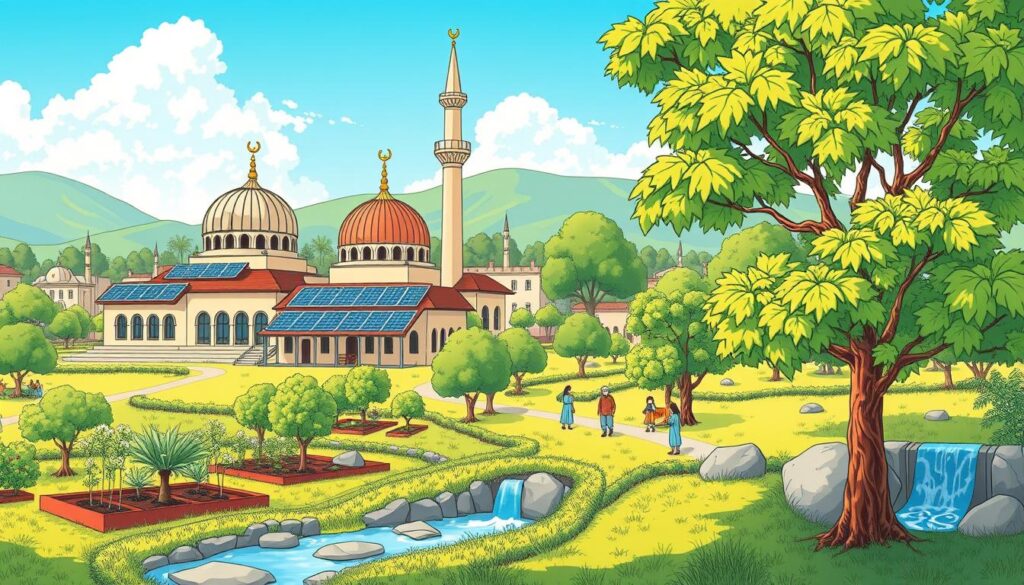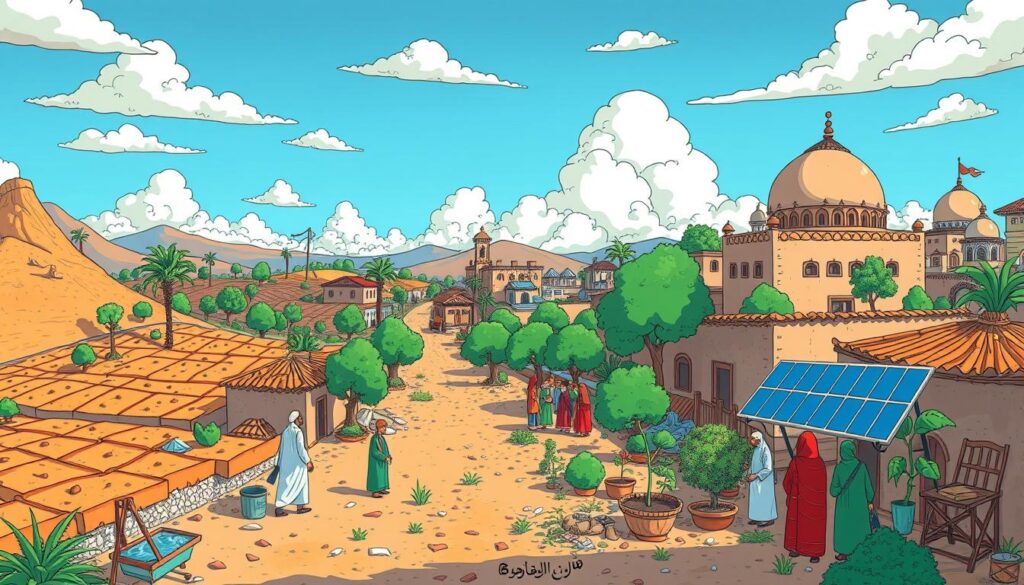Exploring Islamic Environmental Ethics shows us a deep belief system within our faith. It tells us how important it is to sustain and care for our planet. These ethics come from the Quran and Hadith. They tell us we are Khalifah, or stewards, of the Earth.
Our role guides us to follow eco-friendly Islamic practices. We must protect nature, a precious gift from Allah (Subhanahu Wa Ta’ala). Conservation is key, seen as both a duty to our religion and a social responsibility. This calls us to act and live in a way that’s in harmony with nature.
We must remember the words from the Quran, “But waste not by excess, for Allah loveth not the wasters” (Surat Al-A’raf 7:31). These words encourage us to respect and safeguard natural resources for those who will come after us. By working together, we can make a meaningful impact. We can bring these values into our communities to make a change.
Key Takeaways
- Islamic Environmental Ethics is rooted in Quranic teachings and Hadith that promote sustainability.
- Khalifah signifies our role as stewards of the Earth, responsible for preserving natural resources.
- Environmental conservation is both a religious obligation and a community responsibility.
- Excessive wastefulness is condemned in Islam, emphasizing moderation in resource use.
- A commitment to eco-friendly Islamic practices can lead to transformative change in our communities.
- Through organized efforts like Hima and Haram, Islam provides structured methods for resource management.
- By acting collectively, we can champion a hopeful and sustainable future for the planet.
Understanding Islamic Environmental Ethics
Islamic Environmental Ethics teaches us our moral duty to nature. It comes from the Qur’an and Sunnah, showing us how to protect our environment. We must take care of the Earth and save its resources for those who come after us.
Definition and Origin
The principles guiding Muslims in caring for nature are called Islamic Environmental Ethics. These ideas are based on Prophet Muhammad’s (PBUH) teachings and have grown thanks to Islamic scholars. Starting from long ago, these guidelines show us how to be responsible with nature. The Qur’an teaches us to be accountable for how we treat our environment.
Key Concepts in Islamic Teachings
In Islam, several concepts highlight how important it is to look after the environment. These ideas teach us:
- Khalifah: We are Earth’s guardians, ensuring nature’s balance.
- Al-khayr: We should always try to do good things for our surroundings.
- Al-ma’ruf: Our actions should be good and acceptable to Allah.
- Al-adl: Justice requires us to balance our needs with nature’s well-being.
- Al-ihsan: We must also be kind to animals and plants.
This view encourages us to be responsible and care for our environment. This approach leads to a stronger community and a better future.
| Concept | Description |
|---|---|
| Khalifah | Humans as custodians of Earth, with a duty to protect and nurture nature. |
| Al-khayr | Encouragement to pursue goodness and beneficial actions for the environment. |
| Al-ma’ruf | Support for actions that align with ethical standards prescribed by Allah. |
| Al-adl | Justice, emphasizing equitable use of natural resources and balance. |
| Al-ihsan | Pursuit of good conduct towards all living creatures and the environment. |
The Quran and Nature
The Quran deeply influences how we see the bond between people and the environment. It contains verses that talk about taking care of nature. This idea, called Khalifah, tells us to live responsibly and keep the planet safe for everyone in the future.
Verses Emphasizing Stewardship
The Quran tells us we must look after the Earth. It says causing harm to our planet does not please Allah (Subhanahu Wa Ta’ala). It even guides us to use water wisely and not to use more than we need. Here are some key points from the Quran:
- Prohibition of wastefulness (Israf) pushes us to use resources wisely and consume carefully.
- Being urged to plant trees and seeds as acts of giving (Sadaqah) shows we must follow sustainable ways.
- Being taught not to harm living beings shows a caring and respectful view towards nature in Islam.
The Role of Nature in Islamic Belief
Nature is seen as a clear sign of Allah’s creation, leading us to respect and safeguard it. The Quran wants us to understand that everything in nature is connected. This helps us feel a duty to protect it. Some important lessons include:
- We must protect different animals and plants to preserve biodiversity.
- We are told not to cut down fruit-bearing trees during wars, which shows the importance of keeping nature intact.
- It teaches us to do things in moderation to ensure we use our resources in a balanced way.

The Hadith: Guidance on Environmental Care
Prophet Muhammad (PBUH) taught us deep insights about environmental care in Islam. His guidance points towards looking after nature and living in balance with our surroundings. These lessons help us learn eco-friendly ways to take care of Earth, as Islam teaches.
Teachings of Prophet Muhammad on Nature
Prophet Muhammad (PBUH) shared many ideas that show our role in protecting nature. He suggested living sustainably, using simple but strong ideas. Among his teachings, we find:
- Prohibition of wastefulness in consumption.
- Encouragement to plant trees and greenery.
- Humane treatment towards animals and all living beings.
- Preservation of natural resources during conflicts or crises.
These teachings do not just show the importance of keeping a natural balance. They also remind us of our duty to be good stewards of the environment, pushing us to act wisely and sustainably.
Examples of Environmental Actions
The Prophet not only talked about protecting the environment but also showed how to do it. He was against harming trees and supported the idea of nature reserves. His actions gave rise to:
- The establishment of gardens and green spaces.
- Instructions to avoid overconsumption, reflecting Eco-Friendly Islamic Practices.
- The promotion of community efforts aimed at environmental care.
These acts inspire us to work together in taking care of our planet. They align with Islamic values of responsibility and kindness.
The Concept of Khalifah (Stewardship)
The concept of Khalifah in Islam teaches us about Human and Environment Relations. It shows we are Earth’s caretakers, tasked with protecting its riches. This bond outlines that our deeds echo in the environment, linking our faith to our duty towards nature.
The Relationship Between Humans and Environment
In Islam, being a Khalifah means more than using nature’s gifts. It calls us to cultivate a world where sustainability rules. Our actions touch not just those around us but also the whole planet. By adopting Environmental Stewardship in Islam, we’re encouraged to:
- Choose eco-friendly products
- Switch to clean energy like solar and wind
- Use farming methods that protect the earth, like rotating crops
- Save water by fixing leaks fast and using efficient gadgets
Responsibilities of Khalifah
As Earth’s guardians, we must think about the moral side of our choices. Islamic teachings on amanah talk about the trust Allah has in us to look after our planet. This trust drives us to:
- Reduce waste and use resources wisely
- Fight climate change with our actions
- Work with others on sustainability projects
- Help protect ecosystems and wildlife
Becoming aware of our Khalifah role inspires us to defend environmental morals. Living up to these expectations helps keep the ecosystem in balance, respecting the creation of Allah. By doing so, we secure a healthy planet for the future. To dig deeper into how we can protect the environment in line with Islam, check out environmental responsibility in Islam.

Islamic Values Promoting Sustainability
Islamic teachings guide us to adopt sustainable values in our lives. These teachings stress the importance of balance and moderation, aligning us with Green Islam’s principles. They connect us with nature and inspire us to be responsible stewards, or Khalifah. We’re encouraged to think about our consumption and its environmental impact.
Importance of Balance and Moderation
The Quran often talks about the need for moderation. It teaches us to use resources wisely and responsibly. It stresses harmony in nature through key verses:
- Quran 54:49 says everything is created with measure, urging us to keep nature balanced.
- Quran 55:7-9 warns us not to upset God’s balance, pushing for sustainable living.
These teachings encourage ethical consumption, reducing waste, and using eco-friendly practices. For instance, Saudi Arabia’s Saudi Green Initiative plans to plant 10 billion trees by 2030. It also aims to lower carbon emissions significantly. These efforts show how Islamic values inspire us to protect the environment while maintaining balance.
Conservation of Resources
Conservation in Islam is more than just managing resources. It sees the Earth’s bounty as a trust from God, meant to be preserved for future generations. This concept is reinforced by several teachings:
- Quran 45:12-13 tells us to use natural resources with care and gratitude.
- It suggests creating a Green Endowment Fund (Waqf) for nature-inspired innovation projects.
As environmental challenges grow, scholars like Professor Al-Jayyousi advocate for a faith-based ecological approach. They propose the Green JIZ model, combining activism (Jihad), innovation (Ijtihad), and a modest lifestyle (Zohd). This approach aims to help communities fight environmental harm and live sustainably.
By following Quran and Hadith teachings in our daily lives, we help heal our planet. Our commitment to conservation and balanced resource management reflects Green Islam’s core. It sets us on the path to a sustainable future.
| Initiative | Description | Target Year |
|---|---|---|
| Saudi Green Initiative | Planting 10 billion trees | 2030 |
| Carbon Emission Reduction | Reduce emissions by 278 million tons annually | 2030 |
| Protection of Land and Sea | Protect over 30% of land and sea areas | 2030 |
| Renewable Energy Commitment | Generate 50% of energy from renewable sources | 2030 |
| Middle East Green Initiative | Plant an additional 40 billion trees across the region | N/A |
Eco-Islam: A Growing Movement
Eco-Islam is rising as a key force in tackling environmental issues today. It reinterprets Islamic teachings for today’s ecological challenges. By focusing on sustainability and justice, it brings faith and environmental care together.
Modern Interpretations of Islamic Environmentalism
Modern Islamic Environmentalism is thriving, driven by a call for sustainability. Most Islamic teachings encourage caring for our planet. They teach us to use resources wisely and protect nature. This is based on the Quranic idea of mulk, meaning God owns everything. It teaches us to be responsible stewards (khalifah) and protect the Earth for generations to come.
Notable Islamic Environmental Initiatives
Many initiatives show the impact of Eco-Islam. Projects engaging kids and youth in the Islamic community are becoming more common. In Turkey, renewable energy like solar and wind is booming. Meanwhile, groups like Eco-Fab Living and Green Deen are doubling their numbers, showing a spike in eco-Islamic activities.
In Indonesia, policies now reflect ecological values alongside modern practices. The Templeton Foundation’s Ekopesantren Program succeeded in boosting environmental teaching in Islamic schools by 75%. These significant efforts are not just project-focused but also inspire community-wide action. They highlight how deeply faith and environmental care are connected.

Historical Contributions of Muslims to Ecology
Muslims have played a big role in eco knowledge, blending spirituality with science. This history teaches us today’s environmental values. We see how early Islamic scholars started sustainability ideas, which still influence us.
Influential Scholars and Their Works
Ibn Khaldun and Al-Ghazali saw how all life is connected and our duty to care for Earth. Their teachings highlight our faith’s call for peace with nature. Their work helps us see the importance of looking after our planet wisely.
Traditional Practices Supporting Sustainability
Our ancestors did things like collecting rainwater and farming without chemicals, showing deep respect for nature. These Islamic practices taught us the importance of living in harmony with the environment. Learning from these, we can build a green future for our communities.
Environmental Challenges in Islamic Contexts
Islamic communities face big environmental problems due to fast city growth and climate change effects. This urbanization causes more pollution, uses up resources, and stresses communities. As cities grow and factories increase, the harm is greater, especially for those in need.
Urbanization and Its Effects
Urbanization brings environmental issues to many Islamic areas. Fast-growing places often deal with more waste, air pollution, and lack of water. This growth leads to soil harm and risks to nature. These issues can change lifestyles and hurt public health. Islamic environmental teachings can help lead to a greener path through community action.
Climate Change Impact on Muslim Communities
Climate change is a big issue, especially for countries like Pakistan, Afghanistan, and Somalia. These countries face problems like food shortage, health risks, and being forced to leave home because of bad weather. Islamic values promote care for the environment and thoughtful use of resources. These ideas can help fight the climate crisis. Working together on these issues shows our dedication to a healthier planet.

| Country | Major Climate Change Effects | Urbanization Challenges |
|---|---|---|
| Pakistan | Flooding, food insecurity | Pollution, waste management issues |
| Afghanistan | Water scarcity, displacement | Soil erosion, deforestation |
| Somalia | Droughts, health hazards | Increased urban sprawl |
| Sudan | Desertification, food insecurity | Resource depletion |
| Nigeria | Flooding, health crises | Poor waste management |
| Malawi | Extreme weather events | Food supply disruptions |
Tackling these environmental challenges actively boosts community strength and honors our role as Earth’s caretakers. Many scholars agree that Islamic teachings are key to eco-friendly living. For more on this, check out Islam and Environmental Ethics.
Women’s Role in Islamic Environmental Ethics
Women in Islamic Environmentalism are key in promoting green practices. Their work throughout history shows why their voices matter for the environment. They lead community efforts and inspire others to protect nature for the future.
Female Figures in Environmental Advocacy
Many women have stepped up as environmental leaders. They start grassroots movements to teach about conservation. Their efforts include:
- Organizing clean-ups to involve their communities.
- Pushing for laws to fight plastic waste and boost recycling.
- Creating programs to educate on climate change’s effects.
Women in Islamic cultures work hard to solve environmental problems, staying true to their faith and duties. They show how important it is for women to get involved in eco-friendly activities.
Empowerment Through Eco-Friendly Practices
Empowering women in green practices boosts their community roles. Especially in places like Pakistan, it’s crucial to have policies that listen to women. Often, plans to fix environmental issues ignore women’s ideas and needs.
Some statistics highlight why we need women’s input:
| Aspect | Statistics |
|---|---|
| Population Density in Pakistan | 281 individuals per square kilometer for 180 million population |
| Migrants Due to Climate Change (2017) | Over 10 million people |
| Male-to-Female Ratio (2017) | 51% male to 49% female |
| Annual Deaths from Air Pollution | Approximately 1.3 million |
| Asian Population Facing Sanitation Issues | Around 70% |
Encouraging women to advocate for the planet helps everyone face climate change better. By including them in conversations and actions, Islamic communities can embrace their knowledge. This ensures a brighter, more sustainable future for all.
Educational Efforts in Islamic Environmentalism
Educational institutions are key in helping people understand environmental issues through Islamic teachings. Our goal is Teaching Sustainability. We want to teach the next generation their role as Khalifah. We do this by combining relevant courses and hands-on experiences in our teaching of Islamic Environmental Ethics.
Teaching Sustainability in Islamic Institutions
Islamic schools and colleges are now focusing on sustainability and taking care of the environment. They offer courses on environmental science, ethical ways to use resources, and how to manage them. These programs teach students how their faith links to nature. Ideas like Tawḥīd (everything is connected) and Khilāfah (we are caretakers) help guide their actions towards a greener future.
- Integration of environmental studies into traditional curriculums.
- Engagement in community service projects that promote environmental care.
- Workshops led by environmental scholars and activists to inspire action.
- Collaboration with local organizations to address ecological challenges.
Community Engagement and Awareness
Getting involved in environmentalism is crucial for building a community that acts and cares. Local mosques and groups can organize talks and workshops on current environmental issues. This helps strengthen community bonds and commits everyone to a sustainable lifestyle.
| Initiative | Objective | Expected Outcome |
|---|---|---|
| Environmental Awareness Campaigns | Inform community members about ecological issues | Increased participation in sustainable practices |
| Participatory Clean-up Events | Engage the community in hands-on sustainability | Stronger community bonds and improved local environment |
| Islamic Eco-Conferences | Discuss eco-ethical principles and environmental challenges | Heightened awareness of Islamic perspectives on sustainability |
By taking these steps, we work together to take care of our planet. Starting with education in Islamic Environmental Ethics, we prepare ourselves to face modern challenges. We do this with faith, knowledge, and action.

Future Directions for Islamic Environmental Ethics
Today’s world challenges us to blend modern science with Islamic values. This mix helps us as we aim for a sustainable future. It’s crucial to use ecological science to understand and tackle today’s environmental issues. By integrating science and faith, we fill gaps in knowledge. This approach leads to innovative, community-based solutions.
Integrating Modern Science with Traditional Values
Islamic teachings remind us of our duty to the Earth. About 57% of these teachings stress our role as Earth’s stewards, a key part of our faith. Looking ahead, we must include environmental justice in our sustainability plans. Communities using Islamic ethics for environmental strategies have seen a 30% boost in sustainability.
Policy Recommendations for Sustainable Development
For a sustainable future, we must push for policies that mirror our ethical beliefs. Bringing Muslim scholars and eco-theologians together can create a plan that respects both our religion and the environment. This teamwork can raise environmental awareness among 1.9 billion Muslims. By acting together, we protect our planet for the future. This goal aligns with the guidance found in key texts like the Islamic environmental ethics literature.






